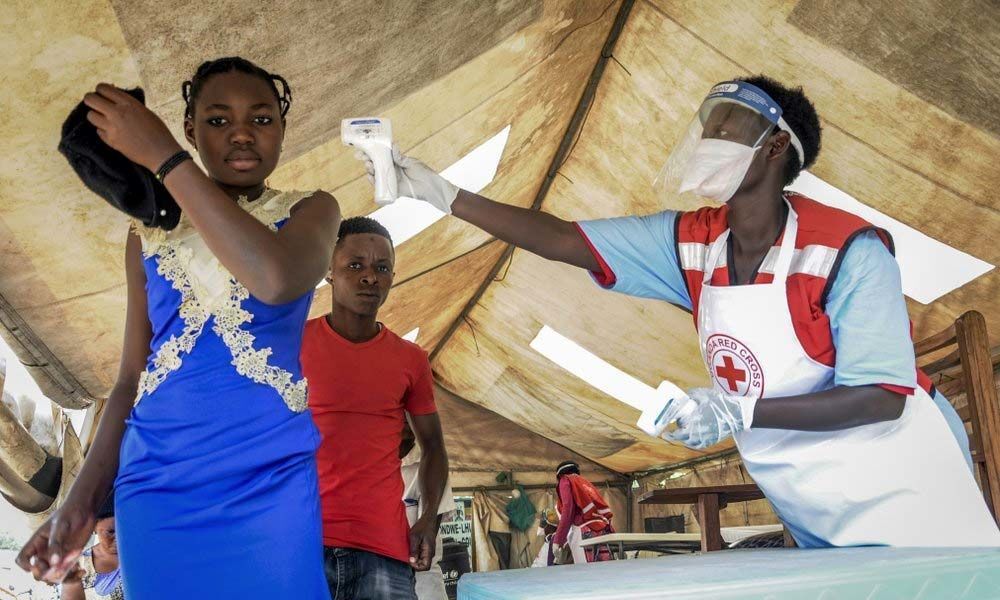Live
- ‘Drinker Sai’ appeals to both younger and family audiences: Producer Basavaraju Laharidhar
- Kerala BJP’s ‘love’ towards Christians is fake: Ex party leader
- Google Gemini Now Features PDF Screen Awareness in the Files App
- Anupama graces Vogue India’s January-February cover
- Captivating poster from ‘Shambhala’ unveiled
- DMK desperately trying to counter BJP‘s rise in TN: ANS Prasad
- Cyber Crimes Surge by 18% in 2024: Director Shikha Goel Reports
- BGT: We are seeing a master at work; I take my hat off to him, says Abbott on Bumrah
- Niranjan Reddy Slams Jupally Krishna Rao and Government Over Irrigation Incompetence
- Gardner reflects on Australia's dominant year after ODI series sweep over NZ
Just In

A 9-year-old Congolese girl who tested positive for Ebola in neighboring Uganda has died, officials said Friday, as the World Health Organization said that the outbreak has neared 3,000 cases.
KAMPALA, Uganda: A 9-year-old Congolese girl who tested positive for Ebola in neighbouring Uganda has died, officials said Friday, as the World Health Organization said that the outbreak has neared 3,000 cases.
The young girl's body will be repatriated with her mother back to Congo for a funeral, according to Dr. Eddy Kasenda, Ebola representative in the Congolese border town of Kasindi.
"We are finalizing the administrative formalities so that the body is repatriated and buried here in Congo, her native country," said Kasenda. "We are collaborating with the health services of neighbouring Uganda and we will strengthen the sanitary measures here in Kalindi."
A Ugandan official at the hospital where the girl had been in isolation confirmed her death overnight. He spoke on condition of anonymity because he was not authorized to speak to reporters.
The girl, who was travelling with her mother, was identified at a border screening Wednesday as a possible Ebola patient and isolated.
Although cases of cross-border contamination have been rare, this case highlights the risk of Ebola spreading across the border into neighbouring Uganda and Rwanda. Borders in the region are often porous, and many people travelling at night use bush paths to cross over.
In June, a family of Congolese with some sick family members crossed into Uganda via a bush path. Two of them later died of Ebola, and the others were transferred back to Congo.
Uganda has had multiple outbreaks of Ebola and hemorrhagic fevers since 2000.
Because the 9-year-old Ebola victim passed through an official entry point this week, Ugandan health authorities believe she had no contact with any Ugandan.
Ebola has killed nearly 2,000 people in eastern Congo since August 2018. The disease is spread through contact with the bodily fluids of an infected person.
WHO said Friday that cases have reached 3,000 in Congo, with 1,893 confirmed deaths and some 900 survivors. An average of 80 people per week are sickened by the virus, which has infected most people in Congo's North Kivu province.
The Ebola outbreak in eastern Congo hasn't shown signs of slowing down despite new treatments and vaccines given to more than 200,000 people in the region and the use of two therapeutic treatments being used as part of a clinical trial.
Insecurity has been one factor in a region where rebel groups have fought for control of mineral-rich lands for decades. Ebola also has spread because of mistrust by communities who have also staged attacks against health workers. Many people in eastern Congo don't trust doctors and other medics.
"Many people are afraid to seek treatment for illnesses, worried they will be sent to an Ebola Treatment Center where they fear they could contract the disease. As an actor within the response, we must assume our own responsibility," said Bob Kitchen, Vice President of Emergencies at the International Rescue Committee. "One year into the response, the lack of community acceptance remains the single greatest obstacle to containing the outbreak. Building trust with the community doesn't just mean dialogue with the affected population. It means working with the community to adapt the response and address the overall needs they are facing inside and outside of the Ebola outbreak."
WHO Director-General Tedros Adhanom Ghebreyesus will travel this weekend to Congo with United Nations Secretary-General Antonio Guterres and senior officials, including Dr. Matshidiso Moeti, WHO Regional Director for Africa.
On Friday he called on partners to increase their presence in the field.
"Our commitment to the people of the Democratic Republic of the Congo is that we will work alongside them to stop the Ebola outbreak," said WHO Director-General Dr Tedros Adhanom Ghebreyesus. "Our commitment also means strengthening the health systems to give them all the other things they need. Building strong systems is what will protect people, communities and the world."
___
Maliro reported from Beni, Congo. AP writers Carley Petesch in Dakar, Senegal and Jamey Keaten in Geneva contributed to this report.

© 2024 Hyderabad Media House Limited/The Hans India. All rights reserved. Powered by hocalwire.com







